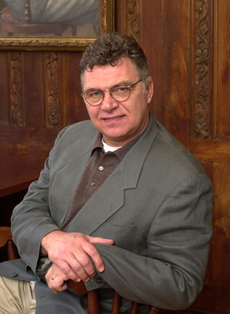John Mack Faragher
Howard R. Lamar Professor of History and American Studies
 Johnny Faragher, B.A. University of California at riverside, Ph.D. Yale University: Born in Phoenix, Arizona and raised in Southern California, you came by your life-long interest in the American West, in migrations, frontiers, and borders by experience and roots. Trained at Yale by Howard Lamar, and after teaching at Mouth Holyoke College for fifteen years, you came back to Yale in 1993, where you helped create the Lamar Center for the Study of Frontiers and Borders. As a colleague and an innovative teacher of undergraduates as well as some 38 Ph. D. students who have gone on to shape the field of the Western history of the United States, you have provided a model of leadership in both of your departments. No one who has served on an orals exam with you can forget the precision of your brief but poignant questions. You brought the declarative voice into that ritual of the subjunctive generality.
Johnny Faragher, B.A. University of California at riverside, Ph.D. Yale University: Born in Phoenix, Arizona and raised in Southern California, you came by your life-long interest in the American West, in migrations, frontiers, and borders by experience and roots. Trained at Yale by Howard Lamar, and after teaching at Mouth Holyoke College for fifteen years, you came back to Yale in 1993, where you helped create the Lamar Center for the Study of Frontiers and Borders. As a colleague and an innovative teacher of undergraduates as well as some 38 Ph. D. students who have gone on to shape the field of the Western history of the United States, you have provided a model of leadership in both of your departments. No one who has served on an orals exam with you can forget the precision of your brief but poignant questions. You brought the declarative voice into that ritual of the subjunctive generality.
As a scholar, you have been a historian’s historian. Your books demonstrate tireless archival research, your writing the clarity and verve of a self-conscious stylist, and your arguments are delivered with a controlled boldness from behind the evidence. At heart, you have always been a Turnerian, a respectful critic/proponent of Frederick Jackson Turner’s famous thesis about the “significance of the frontier” in American history. You have shown over and over how a century of attacks on Turner’s thesis have not, or should not, take the “frontier” out of our vision of American history, even in our own time of great environmental stress and a growing centrality of Native American history. In your own essay in Rereading Frederick Jackson Turner (1994), you assert gracefully but forcefully the “cardinal rule of history: close attention to antecedents.” In other words, build on the work of our forefathers and mothers, rather than stepping on them to exalt ourselves.
Your books demonstrate a remarkable range of topics, styles, and audiences and are universally considered “great reads” as well as fine scholarship. They include five lasting and important monographs, all now (or soon to be) classics: Women and Men on the Overland Trail (1979), which won the Turner Award of the Organization of American Historians; Sugar Creek: Life on the Illinois Prairie (1986); Daniel Boone: The Life and Legend of an American Pioneer (1992); A Great and Nobel Scheme: The Tragic Story of the Expulsion of the French Acadians from Their American Homeland (2005); and the just published, Eternity Street: Violence and Justice in Frontier Los Angeles (2016). But you have taught the reading public and thousands of students as well in three variations on narrative history: Frontiers: A Short History of the American West, with Robert V. Hine; The American West: A New Interpretive History, with Robert V. Hine; and Out of Many: A History of the American People.
Known to all as “Johnny,” a name which connotes affection as well as respect, Yale salutes you on your retirement and wishes you and Michelle all the best in Hamden, New Haven, and on Poppy Peak in Pasadena.
Tribute Editor: Penelope Laurans